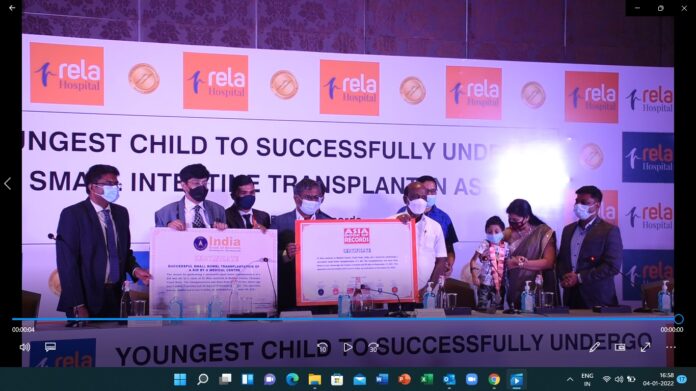 Youngest Child to Successfully Undergo Small Intestine Transplant in Asia (Enters Asia Book of Records)
Youngest Child to Successfully Undergo Small Intestine Transplant in Asia (Enters Asia Book of Records)
~ The young boy’s father donated 150-cm of his small intestine. The boy became Asia’s youngest recipient of a small intestine organ ~
Chennai, Rela Hospital, a multi-speciality, quaternary care hospital in Chennai, has entered the Asia Book of Records for having successfully performed a small intestine transplant surgery on a 4-year-old boy from Bangalore, the youngest in Asia to have undergone this surgery. This rare procedure was recognised by The Asian Book of Records as Asia’s Youngest Small Intestine Transplant Surgery, the certificate of Asia Book of Records was handed over to Prof. Mohamed Rela, Chairman and Managing Director, Rela Hospital, today by Mr. Vivek, a representative of Asia Book of Records in the presence of Mr Ma. Subramaniam, Minister of Health and Family Welfare, Government of Tamil Nadu and Dr J Radhakrishnan, IAS, Principal Secretary Health and Family Welfare, Government of Tamil Nadu.

A healthy and active child, Master Guhan developed sudden and erratic vomiting for 2 days, this got Mr. Swaminathan, the father of Master Guhan worried and rushed him to the neighbourhood hospital thinking it could be a routine stomach infection. To their surprise, the doctors told them that he has a rare condition called volvulus, a rare complication, in which intestine loop twists resulting in cutting off the blood supply to that intestinal loop. An emergency surgery had to be performed, which revealed to the surgeons that the intestinal loop has been completely necrosed (non-viable) and had to be removed, this meant that stomach was attached to skin (stoma). Small intestine, the lower part of the digestive system, is to absorb most of the nutrients from the food. With no small intestine, whatever master guhan eats, will not be digested and just come out of the stoma. Any food taken via mouth will increase gastric secretions, resulting in dehydration and electrolyte imbalance. He was totally dependent on intravenous nutrition and he was connected to infusion pump 24 hours a day to deliver the required nutrients to his body.
Master Guhan, up until then, was hooked onto an infusion pump for ‘intravenous feeding’ was referred to Rela Hospital. Following medical evaluation of Guhan, the family was informed that an intestinal transplantation is the only solution ahead of them. Mr. Swaminathan, father of Master Guhan came forward to donate a part of his small intestine. The clinical team headed by Prof. Mohamed Rela successfully performed this 7-hour long complex transplant surgery on September 13, 2021, during which 150-cm of the father’s small intestine was transplanted to Master Guhan.
After months of total dependency on intravenous nutrition, including 5 weeks on this external feeding post-surgery, Master Guhan has fully recovered. With his small intestine functioning perfectly well, he is now free to have any kind of food like other children of his age. The donor, Mr. Swaminathan has also resumed his day-to-day life, a healthy life.
Expressing appreciation for this accomplishment, Mr Ma. Subramaniam, Minister of Health and Family Welfare, Government of Tamil Nadu, congratulated the management and doctors of Rela Hospital for entering the Asia Book of Records by performing a rare small intestine transplant and bringing back the boy to lead a normal life like other children.
Talking about the procedure, Prof. Mohamed Rela, said, “I feel extremely happy when I see the child leading a normal life, freed forever from the infusion machine. He was totally dependent on it for several weeks, ever since his small intestine was removed. Transplanting a healthy small intestine was the only permanent cure, we managed to successfully perform the intestinal transplantation. Small intestine transplant is a rarely done in India and I appreciate the determination of the parents to get their child back to lead a normal life.”
“For a child of his age, Guhan has already gone through more than most of the kids in the world, and to hear that a transplant was the only option was utterly terrifying but the detailed clinical explanation made us understand that we had to do this. Thanks to the doctors at Rela hospital for their constant reassurance and educating us on every and every step, that made us very comfortable and feel at ease. We will be forever thankful to the to Rela sir and hospital for giving our baby a second chance at life. We now have so many new years to look forward to together as a family”, said Mr. Swaminathan, Father and donor for Master Guhan.
Dr Naresh Shanmugam, Senior Consultant – Children liver and gastro specialist, Rela Hospital said, “Usually children lose only a small portion of intestine due to volvulus. We medically manage the child in our small intestine rehabilitation unit for the remaining intestine to gradually regain function and to start processing food normally. However, Master Guhan’s case was even more complicated, he had lost his entire small intestine to volvulus, and there was no chance for rehabilitation. Hence his small intestine was removed, and nutrients were put directly into his bloodstream intravenously in liquid form. Luckily, we had a ready and loving donor in his father. With the transplanted intestine, Guhan can now move around independently and eat normally.”
Rela Hospital performs small intestine and multivisceral transplant, a highly specialised operation that are only carried out in a small number of specialist centres worldwide. The procedures need extensive matching to avoid/reduce the risk of rejection. In some instances, the small intestine can be obtained from the living donor, but due to the risk to the donor, these are not commonly performed worldwide.






